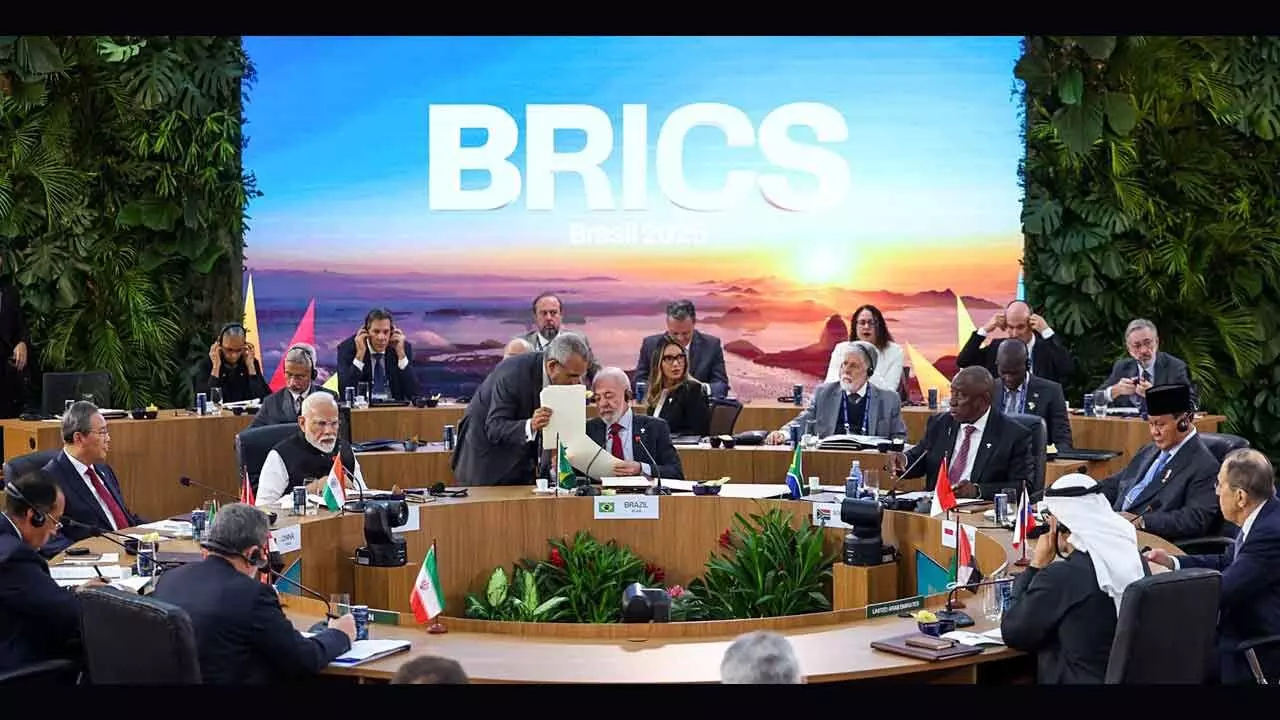BRICS Throws Weight Behind India on Terror and UN Reforms; Condemns Attacks on Iran
Discover how the recent BRICS Summit in Rio delivered significant wins for India, backing its stance on global terrorism and advocating for crucial UN Security Council reforms, while also condemning attacks on Iran.
BRICS Throws Weight Behind India on Terror and UN Reforms; Condemns Attacks on Iran

The recent BRICS summit in Rio de Janeiro delivered a resounding endorsement of India's key geopolitical priorities, with the influential 11-member bloc of emerging economies unequivocally condemning the Pahalgam terrorist attack and championing a comprehensive overhaul of the UN Security Council (UNSC). These critical developments mark significant diplomatic victories for India on the global stage.
Beyond these pivotal takeaways, India also joined BRICS in condemning the recent attacks on Iran, which commenced on June 13. While Israel was not explicitly named, the declaration voiced grave concerns regarding the situation in "Occupied Palestinian Territory," specifically citing the resumption of "continuous Israeli attacks" against Gaza, the obstruction of humanitarian aid, and the alleged use of starvation as a method of warfare – claims vehemently denied by Israel.
The Rio Declaration also saw BRICS nations express serious apprehension over the rise of unilateral tariff and non-tariff measures. These measures, deemed trade-distorting and inconsistent with WTO rules, were an unmistakable message to the Trump administration, though the declaration refrained from naming the US directly due to reservations from some member states. Furthermore, the declaration strongly asserted that unilateral coercive measures, such as economic sanctions, violate international law and carry far-reaching negative implications.
A Unified Front Against Terrorism
At India's persistent urging, the declaration placed considerable emphasis on the scourge of terrorism, advocating for zero tolerance and rejecting the application of double standards in counter-terrorism efforts. This language is particularly significant for India, which consistently employs similar rhetoric to counter Pakistan's support for cross-border terrorism and China's historical protection of UN-banned terrorists based in Pakistan.
The declaration sternly stated, "We condemn in the strongest terms the terrorist attack in Jammu and Kashmir on 22 April 2025, during which at least 26 people were killed and many more injured. We reaffirm our commitment to combating terrorism in all its forms and manifestations, including the cross-border movement of terrorists, terrorism financing and safe havens." It also called for the swift finalization and adoption of the Comprehensive Convention on International Terrorism within the UN framework.
Strongest-Ever Push for UN Reforms
Indian government officials have hailed the Rio summit for adopting the "strongest-ever language" concerning UN reforms. The declaration called for a comprehensive reform of the Security Council, aiming to make it more democratic, representative, effective, and efficient, with a particular focus on increasing the representation of developing countries. Notably, China and Russia, both permanent UNSC members, reiterated their support for Brazil and India's aspirations to play a greater role in the United Nations, including its Security Council, echoing sentiments from the 2022 Beijing and 2023 Johannesburg Declarations. Interestingly, the Beijing declaration had previously referred generally to the UN, not specifically "including in UNSC," underscoring the stronger stance taken in Rio. The Rio Declaration further emphasized that a reformed UNSC would amplify the voice of the Global South.
Navigating the Middle East Labyrinth
While condemning the attacks on Iran – and expressing concern over "deliberate" attacks on "peaceful" nuclear facilities under IAEA safeguards – the declaration also intricately wove in references to the Israel-Palestine issue, a topic that continues to challenge India's delicate diplomatic balancing act.
Regarding Iran, the declaration, unlike an earlier BRICS statement last month, refrained from naming Israel but explicitly condemned the military strikes. On the Gaza front, the declaration was more explicit, mentioning "continuous Israeli attacks," calling for adherence to international law, and reaffirming the Gaza Strip as an inseparable part of the Occupied Palestinian Territory. It also demanded a full withdrawal of Israeli forces from the Gaza Strip and urged talks for an immediate and unconditional ceasefire.
However, it's important to note that while the Rio summit intensified pressure on Israel by referencing allegations like the use of starvation, this isn't the first instance of India joining BRICS in denouncing some of Israel's actions in Gaza. Similar condemnations were voiced at a meeting of foreign ministers in June last year and again at the Kazan summit, where BRICS denounced Israeli attacks against humanitarian operations and facilities.

